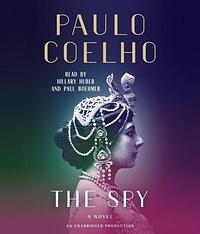Take a photo of a barcode or cover
This was a very interesting and quick read. I had not heard of Mata Hari, and now after reading this book I want to read more and know more about her. The book was written as a letter from Mata Hari to her daughter to explain to her how her life played out and why she wanted it played out like that. The extent she went to to feel freedom and independence away from the abuse she feel victim to in her life. It was very fast paced and I understand that the book was not to give a full account of her life but more so a representation of the inequality of women vs men around the world war 1 era and how hard it was to fight for any sort of ‘freedom’ but I left wanting to know more. Little things like what happened to her daughter, did she really just up and leave her no thoughts about that? Other then I wanted to know more, it was a nice, quick, interesting read.
I remember writing a report about Mata Hari when I was in elementary school. I was fascinated with her, and my teacher was a bit scandalized. At the time, I didn’t understand why.
I enjoyed reading Coelho’s take on her life, despite the fact that he played fast and loose with historical record (especially in regard to her motivations for becoming a courtesan.
I enjoyed reading Coelho’s take on her life, despite the fact that he played fast and loose with historical record (especially in regard to her motivations for becoming a courtesan.
I expected more of a narrative. It's still surprising how little information the authorities had on Mata Hari. It just seemed like they hated that she wasn't afraid of authority.
Paulo Coelho, author of The Alchemist and The Witch of Portobello, again bewitches readers with The Spy, a novel based on the life of Mata Hari.
Based on real events
Based around the historical facts surrounding her life and 1917 arrest, Coelho weaves together a first-hand account of what really happened during her life - how she felt, and justifies some of the reasons for her actions.
The Prologue describes Mata's gruesome execution by firing squad. Imagining her final moments as she gets dressed for a final time and fearlessly faces her own death with open eyes - refusing to be blindfolded.
The letters she penned greatly inspired Coelho, helping to shape the voice of Mata. Using the pronoun "I", Coelho writes the story from her perspective, in the way he believes she must have felt.
Coelho brings depth to her story, combining fact with fiction. He provides readers with both her emotional state of mind as well as researched facts behind the case - modern evidence suggests her innocence. Integrated into the story are an assortment of the lists and clippings Mata Hari had collected and deliberately left behind before her execution, as well as historical photographs of Mata herself.
pg. 12
The Spy chronicles Mata Hari's abusive relationship to the Indonesian Army Captain, the birth (and deaths) of her children, and her cultural isolation while living in Indonesia. Mata identifies these events as sources of the pain she faced and reveals that she used dance and sexuality as weapons to overcome her nightmare.
My decision: I could no longer accumulate problems and live so far beyond the limits of human suffering. (27)
Mata Hari's story is a classic exhibition of overcoming ones weaknesses to assert ones self as independent. Although her rebellious actions cost her her life, she remains an archetype for the modern independent woman who refuses to stifle one's sexuality.
Based on real events
Based around the historical facts surrounding her life and 1917 arrest, Coelho weaves together a first-hand account of what really happened during her life - how she felt, and justifies some of the reasons for her actions.
The Prologue describes Mata's gruesome execution by firing squad. Imagining her final moments as she gets dressed for a final time and fearlessly faces her own death with open eyes - refusing to be blindfolded.
The letters she penned greatly inspired Coelho, helping to shape the voice of Mata. Using the pronoun "I", Coelho writes the story from her perspective, in the way he believes she must have felt.
Coelho brings depth to her story, combining fact with fiction. He provides readers with both her emotional state of mind as well as researched facts behind the case - modern evidence suggests her innocence. Integrated into the story are an assortment of the lists and clippings Mata Hari had collected and deliberately left behind before her execution, as well as historical photographs of Mata herself.
pg. 12
The Spy chronicles Mata Hari's abusive relationship to the Indonesian Army Captain, the birth (and deaths) of her children, and her cultural isolation while living in Indonesia. Mata identifies these events as sources of the pain she faced and reveals that she used dance and sexuality as weapons to overcome her nightmare.
My decision: I could no longer accumulate problems and live so far beyond the limits of human suffering. (27)
Mata Hari's story is a classic exhibition of overcoming ones weaknesses to assert ones self as independent. Although her rebellious actions cost her her life, she remains an archetype for the modern independent woman who refuses to stifle one's sexuality.
I thought this was an interesting book about Mata Hari. I had never read anything about her before. The extra for me was this is a book that is translated so I can check that off my book challenge for the year ;)
This book was not really what I was expecting, but it was great. I knew practically nothing about Mata Hari and this was a great intro to her life and experiences. Paulo Coelho has such a unique writing style and it really worked here as Mata Hari writes a letter with a very brief version of her life story. She doesn't slog through the details, but it is more a reflection about what she's been through and how it affected her decisions later in life. More reflections than action really, but in such a great sassy tone. Mata Hari is genuinely perplexed why anyone would consider her a spy and want to sentence her to death. She was definitely a complex person and I would love to read more in depth about her life, but that's not what this book was meant to be.
A short review because it is a short book, but very enjoyable to read.
A short review because it is a short book, but very enjoyable to read.
Based on the life of Mata Hari - a good read.
‘Long after she was executed the prosecutor, Andre Mornet 1947, admitted that - “Between us, the evidence we had was so poor that it wouldn’t have been fit to punish a cat” ‘
‘Long after she was executed the prosecutor, Andre Mornet 1947, admitted that - “Between us, the evidence we had was so poor that it wouldn’t have been fit to punish a cat” ‘
A perfectly enjoyable read, but it felt rather simplistic and I wanted more depth.
“Voilà ce qu'a été ma vie. Je suis le rossignol qui a tout donné et qui en est mort.”
LU 2018
J'ai lu cette livre en français, et ce n'est pas ma langue maternelle, si je suis désolée si tout que j'écrirai dans le texte n'est pas 100% correcte. J'ai étudié le français à l’école pour, je pense, cinq et demie ans, et j'ai lu cette livre parce que j'ai voulu perfectionner mon français. Mais aussi, l'histoire semblait très intéressante.
Je dois dire que je ne sais pas beaucoup de Mata Hari ou sa vraie vie, et je ne sais pas si l'histoire dans cette livre a fait sa justice. Toutefois, j'ai pensé que l'histoire qui a écrit par Paulo Coelho était impérieux, et j'ai lu le livre à un jour (oui, je sais que le livre est court, mais je suis un peu impressionante de moi-même parce que j'étais capable de lire un livre français dans une courte période de temps). L'histoire était bon, et je l'aime, mais c'était un peu comme la surface de l'eau; il est calme et bien et beau, mais nous ne pouvons pas plonger dans la profondeur de la mer, et nous ne recevons pas de découvrir ce qui se cache en dessous. Cependant, ce que j'ai aimé le plus, c'était l'écriture, et j'ai trouvé beaucoup des citations étonnantes. Mes favoris sont ceux-ci:
"En temps de guerre, la première victime est la dignité humaine."
"Il est regrettable que ce qui arrive aujourd'hui soit déjà arrivé hier, arrivera encore demain, et continuera à arriver jusqu'a la fin des temps, ou jusqu'a ce que l'homme découvre qu'il n'est pas seulement ce qu'il pense, mais qu'il est surtout ce qu'il sent.
LU 2018
J'ai lu cette livre en français, et ce n'est pas ma langue maternelle, si je suis désolée si tout que j'écrirai dans le texte n'est pas 100% correcte. J'ai étudié le français à l’école pour, je pense, cinq et demie ans, et j'ai lu cette livre parce que j'ai voulu perfectionner mon français. Mais aussi, l'histoire semblait très intéressante.
Je dois dire que je ne sais pas beaucoup de Mata Hari ou sa vraie vie, et je ne sais pas si l'histoire dans cette livre a fait sa justice. Toutefois, j'ai pensé que l'histoire qui a écrit par Paulo Coelho était impérieux, et j'ai lu le livre à un jour (oui, je sais que le livre est court, mais je suis un peu impressionante de moi-même parce que j'étais capable de lire un livre français dans une courte période de temps). L'histoire était bon, et je l'aime, mais c'était un peu comme la surface de l'eau; il est calme et bien et beau, mais nous ne pouvons pas plonger dans la profondeur de la mer, et nous ne recevons pas de découvrir ce qui se cache en dessous. Cependant, ce que j'ai aimé le plus, c'était l'écriture, et j'ai trouvé beaucoup des citations étonnantes. Mes favoris sont ceux-ci:
"En temps de guerre, la première victime est la dignité humaine."
"Il est regrettable que ce qui arrive aujourd'hui soit déjà arrivé hier, arrivera encore demain, et continuera à arriver jusqu'a la fin des temps, ou jusqu'a ce que l'homme découvre qu'il n'est pas seulement ce qu'il pense, mais qu'il est surtout ce qu'il sent.
“It is a shame that what happens today already happened yesterday, and will happen again tomorrow; it will continue to happen until the end of time, or until man finds out he is not only what he thinks, but mostly what he feels. The body tires easily, but the spirit is always free and will help us get out, one day, from this infernal cycle of repeating the same mistakes every generation. Although thoughts always remain the same, there is something stronger, and this is called Love.”
Excerpt From: Coelho, Paulo. “The Spy.” Knopf, 2016-11-22. iBooks.
This material may be protected by copyright.
Check out this book on the iBooks Store: https://itun.es/us/SO3Hdb.l
Excerpt From: Coelho, Paulo. “The Spy.” Knopf, 2016-11-22. iBooks.
This material may be protected by copyright.
Check out this book on the iBooks Store: https://itun.es/us/SO3Hdb.l



